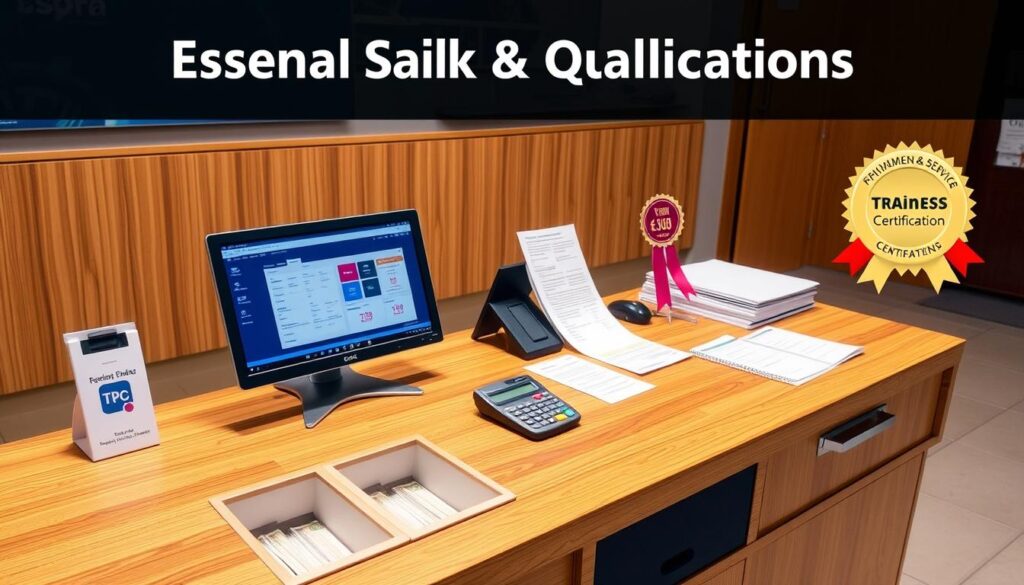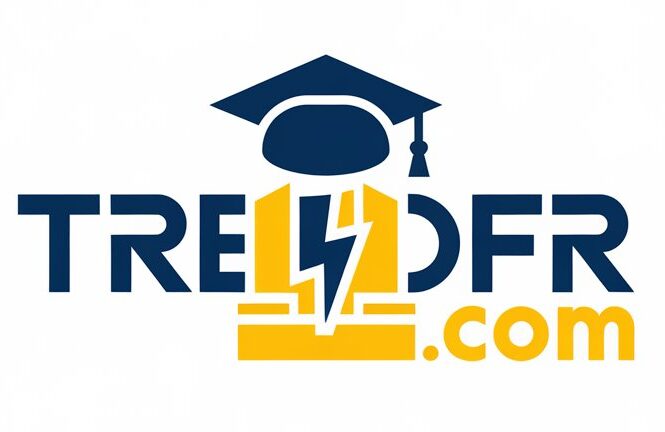About 75% of banks need tellers to have some education for entry-level jobs. This is key to starting a career in banking. To be a good bank teller, you need both school smarts and technical skills. There are many entry-level banking jobs in the United States.
Knowing what education is needed for tellers is vital for those wanting to work in banking. With the right education and skills, you can get hired and move up in your career. The banking world has lots of chances for growth, making it a great career choice.
Key Takeaways
- Bank teller qualifications are essential for entry-level positions
- Teller education requirements vary depending on the bank and location
- Entry level banking jobs are available across the United States
- Technical skills and academic credentials are necessary for success
- Understanding teller education requirements is crucial for career advancement
- Banking industry offers opportunities for growth and development
Understanding Basic Bank Teller Education Requirements
To become a bank teller, you need to meet certain teller education requirements. You must have a high school diploma or its equivalent. You also need basic computer skills and knowledge of banking operations.
In the banking industry, tellers must have a solid math background and excellent customer service skills.
For teller job qualifications, most banks look for a certain level of education and training. This might include courses in finance, accounting, and business. Many banks also provide on-the-job training to help new tellers learn the ropes.
Understanding banking industry requirements is key for tellers. They must be able to navigate complex financial systems and offer top-notch customer service.
Some important skills and qualifications for bank tellers include:
- Basic math skills and attention to detail
- Strong communication and customer service skills
- Ability to work well under pressure and meet deadlines
- Basic computer skills and knowledge of banking software
By meeting these teller education requirements and developing the right skills, you can thrive as a bank teller. It’s vital to research and grasp the specific banking industry requirements and teller job qualifications for each bank or financial institution.
Essential Skills and Qualifications for Bank Teller Success
To be a successful bank teller, you need certain skills and qualifications. The banking world is strict, and you must have attention to detail, great communication skills, and handle stress well. Teller certification programs can boost your skills and career.
Here are the main skills and qualifications for bank teller success:
- Academic qualifications: a high school diploma or equivalent, with some banks requiring a college degree
- Technical competencies: proficiency in banking software and systems, as well as basic computer skills
- Soft skills: excellent customer service skills, ability to work in a team, and effective communication skills
Teller certification is also key for career growth in banking. The requirements for certification vary, but most cover banking laws, customer service, and financial products.

With the right skills and qualifications, you can excel as a bank teller. Meeting the banking industry’s needs can help you achieve your career goals. The right mix of education, technical skills, and soft skills is crucial.
Professional Development and Training Programs
Being a bank teller requires the right skills and knowledge. Banks offer training programs to help employees grow. These include classroom lessons, on-the-job training, and online courses. Some banks also have certification programs for special banking areas.
For those starting in banking, entry-level jobs are a great start. Banks have training for new employees. It covers bank procedures, customer service, and financial products. This training helps new employees build skills and confidence.

- Bank-sponsored training like workshops and seminars on customer service and financial products
- Certification options, such as the Certified Bank Teller (CBT) designation
- Continuing education like online courses and conferences on banking regulations and trends
These programs help bank tellers improve their skills and stay current. This is good for career growth and job satisfaction.
Conclusion: Building Your Career Path in Banking
The banking industry has clear education needs for bank tellers. They must have both basic skills and soft skills to succeed. But, there’s more to it than just starting out.
Training and development programs are vital for tellers to grow. Banks offer many ways to learn and improve. This keeps tellers up-to-date and ready for new challenges.
By keeping up with education needs and learning more, tellers can move up in their careers. They can go from entry-level to management roles. The banking world values tellers for their skills, which helps keep customers happy and finances safe.
FAQ
What are the basic education requirements to become a bank teller?
To become a bank teller, you usually need a high school diploma or GED. Many banks also look for candidates with some college courses or experience in customer service or finance.
What technical skills are required for bank tellers?
Bank tellers must know how to use banking software and technology. This includes cash handling systems, CRM tools, and basic accounting software. They also need strong math skills and attention to detail.
What soft skills are important for bank tellers?
Bank tellers need great communication skills and problem-solving abilities. They should also be customer-service focused. Tellers must work well under pressure and show integrity and professionalism.
Are there any certification programs for bank tellers?
Yes, there are certification programs for bank tellers. The American Bankers Association (ABA) offers the Certified Teller Program (CTP). These programs give specialized training and show a teller’s expertise and professionalism.
What career advancement opportunities are available for bank tellers?
Bank tellers can move up by taking on more responsibilities. They can become lead tellers, supervisors, or customer service reps. With more training and education, they can also move into roles like loan officers or financial planners.

